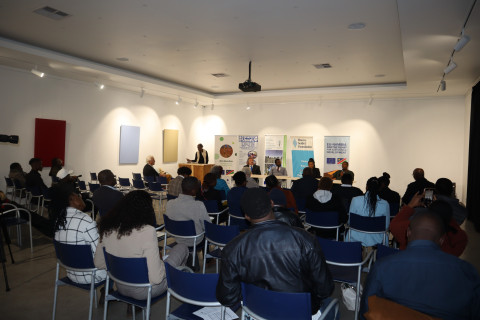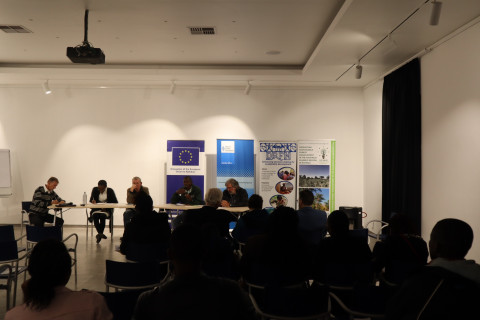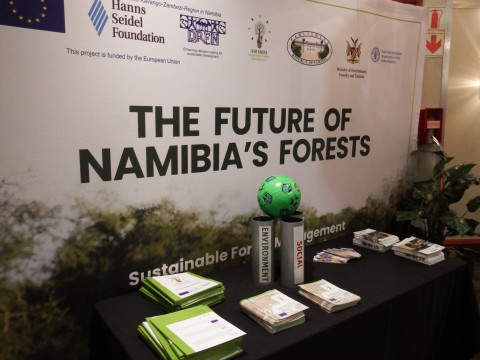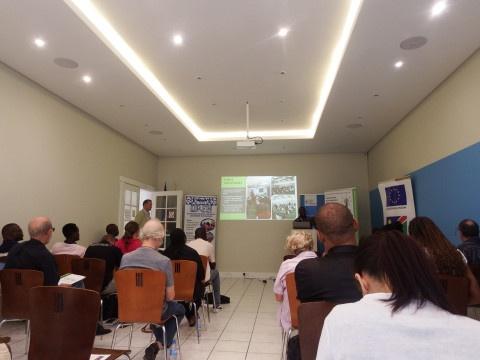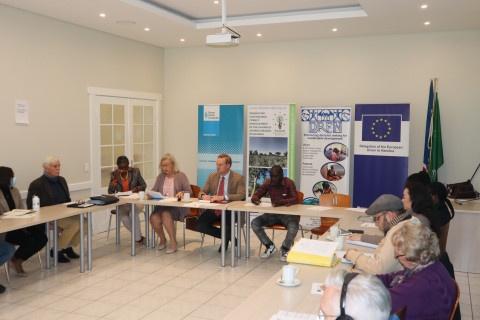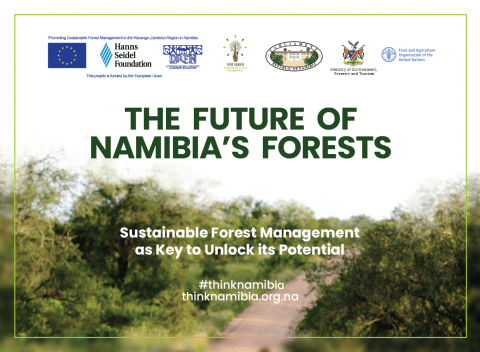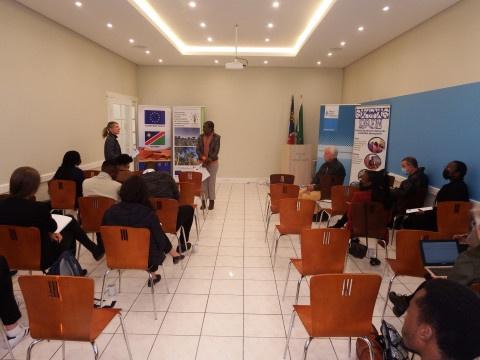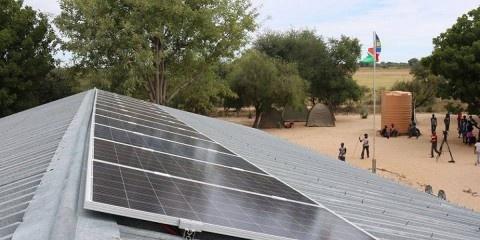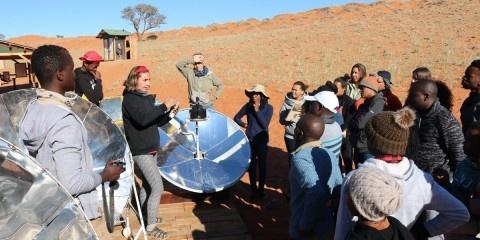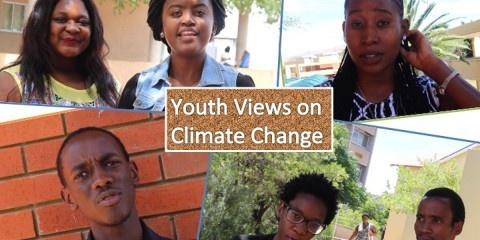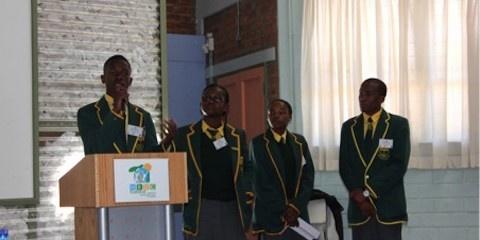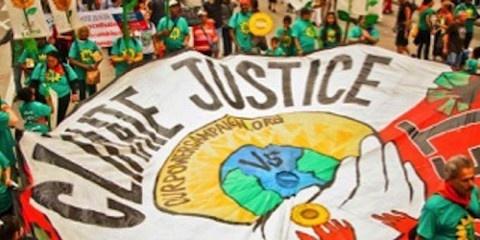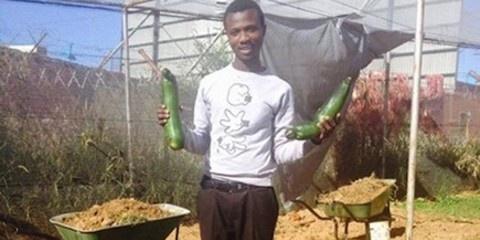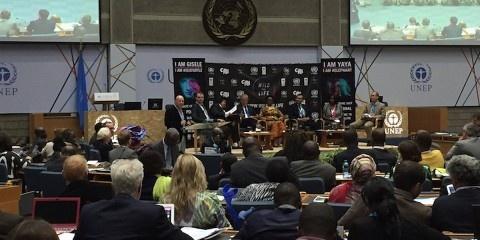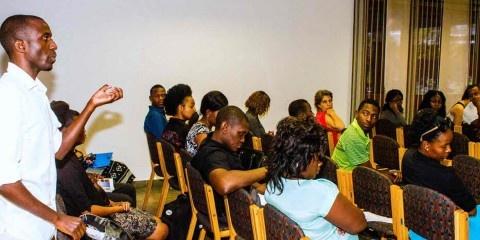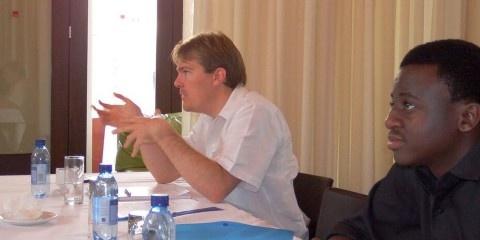On the 2nd of August 2023, the ‘Namibia Sustainable Forest Management’ (NSFM) Project hosted a public discussion at Goethe Institute in Windhoek. The discussion was aimed at shedding light on how to add value to Namibian forests products in terms of sustainable forest management as the key to unlocking its potential from different perspectives. The event was attended by different forestry...
On the 6th of June 2023, the ‘Namibia Sustainable Forest Management’ (NSFM) Project hosted a public discussion at Goethe Institute in Windhoek. The event aimed at discussions focusing on the illegal extraction of Namibia’s forest resources from the KAZA Regions as well as looking at the future of Namibia’s forest in terms of sustainable forest management as the key to unlocking...
On 16 May 2023, the Namibia Sustainable Forest Management (NSFM) Project held a Symposium on ‘The Role of Forests in Sustainable Development’ at Protea Hotel Furstenhof, Windhoek. The Symposium is the second of a series of conferences of the NSFM-Project and was aimed at looking at the future of Namibia’s forest in terms of sustainable forest management as the key to...
On the 28 of February 2023, the NSFM-Project conducted a late morning talk event at the House of Democracy in Windhoek. The event was aimed at the mid-term review of the NSFM-Project with a presentation on activities and key achievements of the project. Various stakeholders from different organisations, NGOs and institutions attended the event which was officially opened by the Resident...
The NSFM-Project is happy to announce that the conference proceedings of its first national conference on ‘The Future of Namibia’s Forests’ are available. The proceedings compile a selection of speeches and presentations that have been held at the conference titled ‘The Future of Namibia’s Forests – Sustainable Forest Management as Key to Unlock its Potential’ that has been hosted by the...
The SFM project held a round table discussion with media representatives on stopping the poaching of Namibia’s forestry resources at the House of Democracy, Windhoek, on 7 July 2022. The discussion was attended by members from inter alia New Era Publication Cooperation, Ministry of Education, NNF, European Union, Hitradio Namibia, Ministry of Environment, Forestry and Tourism, NBC, Legal Assistance Center, City...
On 20 July 2022, the NSFM-Project together with the Parliament of Namibia, the Ministry of Environment, Forestry and Tourism as well as the Food and Agriculture Organization hosted a National Conference on the subject ‘The Future of Namibia’s Forests – Sustainable Forest Management as Key to Unlock its Potential’. You find all presentations as a download below. Opening Session ‘The...
The NSFM project held a teacher and educators’ seminar on Sustainable Forest Management (SFM) on 2 June 2022 at the House of Democracy, Windhoek. The seminar was attended by organisations such as EduVentures, LAC, DAPP, WWF, IUM, UNAM, NIED, teachers, NEEN members etc. The seminar was aimed at informing decision-makers of the school curriculum and educational programmes on SFM and its...
With the COVID-19 crisis impact still present and weighing on us all, the current situation also provides an opportunity to look beyond our daily lives and to expand your knowledge. Given the myriad environmental challenges facing nations, it is important to have concrete resources from which and with which to manage existing environmental challenges. A common challenge, especially in Namibia, is a...
Access to electricity is critical to health care delivery and to the overarching goal of universal health coverage. However, the availability of electricity to support proper health services is less than adequate in many countries. According to the World Health Organization (WHO) studying over 4000 clinics and hospitals, about one in four health facilities has had an unreliable electricity supply. Clinics, maternity wards,...
WINDHOEK – With recent climatic disaster experienced in the Southern African region, Namibia says it is high time to call for the full implementation of the Paris Climate Agreement, and for all state parties to honour their commitments particularly to small states that are at the receiving end of climate calamities. This call was made by international relations Executive Director Selma...
Solar Cooking and Sustainable Living Workshop. “During the week, one of the most important lessons was that a lot of things can be reused, instead of throwing them away. With an old drum, big nails, wire and pliers, one can build a fuel-efficient stove, that can replace cooking on open fires. With a bucket, a tap, a shower rose and some...
Environmental Sustainability Champion Of The Month (August) We profile an individual or organisation every month making great strides for environmental protection, climate change adaptation and mitigation or sustainable development in Namibia. Environmental Sustainability Champion For August 2017: Ester Hango Ester Hango is an Environmental Educator at the Ministry of Sport, Youth and National Services. She has a passion for the environment and is committed...
Carbon dioxide (CO2) is one of the many greenhouse gases that in increased amounts contribute to global warming and climate change that we are currently faced with in Namibia and the world at large. Soils and plants store a lot of carbon, nearly twice the amount found in the atmosphere. This stored carbon in the soil acts as the basis of...
How Namibian Millennials Are Combating The Causes And Effects Of Climate Change Lifehack #1: Be Namibia’s Leo DiCaprio (on a budget) In my first blog post, I introduced you to the topic of climate change according to a Namibian millennial, whereupon I shared my views on climate change and shone the spotlight on climate justice. In this post I will be...
In the beginning, when the greatest of all scientists breathed life in all ecosystems and biodiversity, everything was in unison with each other, from the flying birds, to the flowing rivers and flora and fauna. Everything was normal, so much so that ecosystems were interlinked without any disturbance. The weather patterns were normal, the harvests were exceptional and the temperatures were...
Climate Change According To A Namibian Millennial Millennial; also known as Generation Y refers to those born between roughly the years 1980 and 2000. We the children born during and after the independent struggle, are the Namibian millennial. Critics call us the narcissistic, self-entitled generation; the trophy kids, who skip through life on the basis of participation is enough. I tend...
I grew up around rivers and enjoyed the rain every year. I never thought that one day I would see some of these rivers dry up. When I was younger I asked myself, what could have happened for the rivers to dry up? I thought the rains would always come and so everything would always flourish in accordance to the same...
Read this snapshot of the activities of the ThinkNamibia team over January and February 2016. The Green Lightbulb, Issue 1 BY LESLEY-ANNE VAN WYK, THINKNAMIBIA ENVIRONMENTAL AWARENESS
On the 23rd of May 2016, world environment leaders and experts convened in a cloudy Nairobi at the United Nations Environment Programme (UNEP) headquarters to open the second session of the highest-level decision-making body on the environment, namely; the United Nations Environment Assembly (UNEA-2). The theme for the UNEA-2 is ‘Delivering on the environmental dimension of the 2030 Agenda for sustainable development’. The UNEA...
Namibia ratified the United Nations Framework Convention on Climate Change (UNFCCC) in 1995. As a Non-annex 1 party to the Convention, Namibia is not obliged to reduce its Greenhouse Gas (GHG) emissions. However the country’s dependence on energy from South Africa and its favorable conditions for renewable energy, makes the transition to a low carbon economy an important long-term strategy. Climate...
In this article I intend to communicate why gender matters in climate change vulnerability assessments. I would like also to demonstrate with findings from my research work on gender and climate change in Namibia why it is vital to recognise gender differentiated vulnerabilities to impacts of climate change for effective and equitable adaptation. Existing literature and on-going research indicates that climate...
Namibia has an excellent legislative and policy backdrop for environmental protection and sustainable resource management. However, its economy is highly dependent on natural resources including diverse rangelands, arable land, mineral deposits, ecosystems and biodiversity. Economic and social development will be negatively affected with the challenges posed by climate change; especially with regard to water availability, food and livelihood security. There has...
Addressing climate change calls for multiple approaches. Nowadays there are so many messages that tell us what we should or should not do that it is often di cult to know what is right and what is wrong. The Namib Desert Environmental Education Trust (NaDEET) tackles climate change education through a “we practice what we teach” approach. Within this context, the...
I farm in the great Kunene region and this year of all years we feel the impacts of climate change the most. The farming business has become very fragile as we depend on Mother Nature for watering our crops and the veld in which our livestock graze. As such, the highly unpredictable rainfall in Namibia negatively impacts our farming activities. It...
Climate change projections for Namibia project temperature increases of 1 to 4°C and increased variability in rainfall patterns. The climate risks associated with temperature increase and unpredictable rainfall will impact subsistence farmers and consequently the rural Namibian population that rely mainly on rain-fed agriculture. The Adaptation at Scale in Semi-Arid Areas (ASSAR) is conducting research to deepen understanding of the drivers...
The EU is committed to become a highly energy-efficient, low-carbon economy, and is therefore at the forefront of international efforts to tackle Climate Change. Building a European Energy Union with a forward-looking climate policy is a top priority for the European Commission. As such, the EU has chosen the headship mode of leading by example, being the first region to have...
Paulus Hamutenya takes a close look at the tomato plant in his field. With his hands he feels the texture of the stems and leaves on the plant – nodding with distinct approval at the combination of quality, colour and thickness. “The organic fertilizer we have tried out for the last 2 months is definitely working”, he remarks with inevitable pride....
Climate Change Adaptation is a buzzing topic on the international agenda. But is it clear what adaptation to climate change in relation to ecosystems and their services means? Choosing the right approach and designing effective ecosystem-based adaptation measures is of utmost importance in order to successfully shield from the impacts of climate change. The Ministry of Environment and Tourism (MET), in...
Water in Namibia is free, but it also has a cost. This cost is the cost to supply water from its source to the tap of the user and does not include any cost for the water itself. The cost to supply water under the prevailing arid conditions in Namibia is very high and the therefore water is expensive. The trick...
On the 1st of October, 2015, the Water Youth Namibia, Hanns Seidel Foundation (HSF) Namibia and Desert Research Foundation of Namibia (DRFN) co-hosted a public dialogue focused on the role of youth in addressing Namibia’s water scarcity challenges. Water’s central role in the biosphere has long implied that several of the most important challenges confronting human development are related to fresh...
From the 27-28 August 2015, a Climate Change Media Training for Namibian Journalist was held in Windhoek. The training was initiated by the Media for Environment, Agriculture and Sustainable Development in Namibia (Mead-Namibia) and was funded by the Hanns Seidel Foundation (HSF) Namibia, through its Environmental Awareness and Climate Change Project. It was held at the Namibian Institute of Culinary Education (NICE)...
The United Nations Development Programme (UNDP) in Namibia has been supporting the Government and People of Namibia with the implementation of development programmes and projects since 1990. Such programmes and projects generally aim to improve the protection and conservation of natural resources, particularly renewable ones that people depend on for daily survival, i.e. use for food and to secure incomes and...
The extent to which any Government facilitates the requirements for equitable access to water and sanitation by its citizens has been under discussion for a long time by the international community. On 28 July 2010, after years of campaigning to capture the right to water and sanitation services, the United Nations General Assembly eventually passed Resolution 64/292 in which the right...
The other main reason to start this project is to educate and motivate people to conserve and sustain our environment through urban gardening. Being a part of the Tsumeb Young Achievers group has extremely uplifted and motivated me to pursue my interest in climate change. I want to encourage young people out there to contemplate sometime in their lives about starting...
It would be wrong and foolish to assume that the world’s leaders are incapable of the wisdom and foresight needed to come to an agreement this December in Paris on setting global limits to Greenhouse Gas Emissions (GGE). It would be equally wrong to believe that these politicians are incapable of the guile to agree on nothing more than what they...
Wolwedans – a household name in the Namibian tourism circuit – is more than a collection of camps. Its ethos lies in setting an example in sustainable business practices. During 2015 the entire Wolwedans Collection was audited by Eco-Awards Namibia and scored a five-flower rating at the very first go. This remarkable achievement affirms the leading role Wolwedans has adopted in running...
